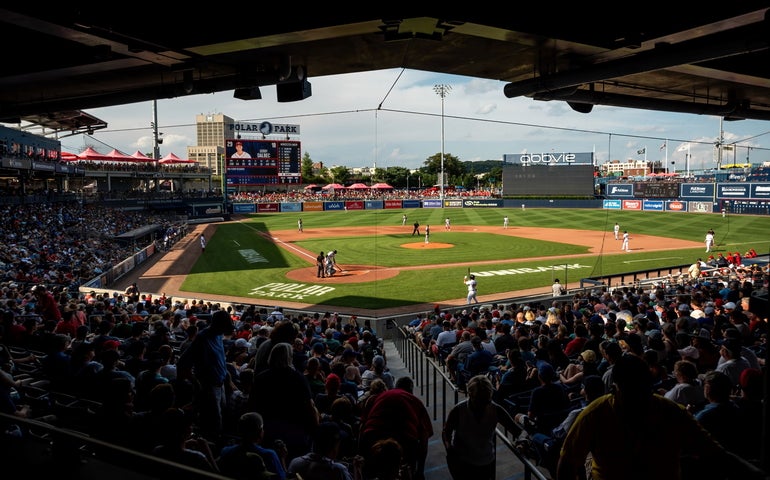Breaking the pay-for-itself promise from when the project was initially proposed, the City of Worcester will need general taxpayer funds to make its payments on the $160-million Polar Park public baseball stadium.
Additionally, one of the key development deals in making the project affordable – for the so-called Left Field Building – has been terminated.
A letter from City Manager Eric Batista to the Worcester City Council ahead of Tuesday’s council meeting has revealed the special financing district around Polar Park will have a shortfall of $792,000, meaning the City will have to make up the difference using its general fund.
When the City initially proposed in 2018 to build Polar Park in order to move the minor league baseball team Pawtucket Red Sox to Worcester for the 2021 season, former city manager Edward Augustus claimed the stadium project would pay for itself using increased government revenues from a special tax and development district around the stadium.
Augustus said this pay-for-itself guiding principle was the City’s North Star in building the stadium, and Batista echoed that sentiment when he took over as city manager.
At the end of the 2024 fiscal year, the City had figured it would again be able to make the bond payments for the stadium financing solely using the fund generated within the district improvement financing (DIF) area, but budgeted revenues did not meet what was actually collected by the City, resulting in an obligation by the DIF to the City’s general fund of approximately $792,000.
To make up the shortfall, the City will pay $792,000 out of its general fund. The plan is for the DIF fund to pay that money back at a future time when the district is generating excess revenues. Over its 30-year lifespan, the City still is predicting the DIF will create $50 million in excess revenues to be paid into the general fund.
The City of Worcester didn’t offer additional information regarding the shortfall beyond what was in the letter. In a text message to WBJ, City spokesman Tom Matthews said the city wouldn’t make further comment until after the city council meeting.
Additionally, Boston developer Madison Properties has terminated the tax-increment-financing agreement to develop the so-called Left Field Building, which was slated as a bioscience facility, according to Batista’s letter. When the stadium deal was announced in 2018, Madison agreed to build five private residential, office, and hotel developments, which were all key in generating tax revenue in order for the DIF to make the payments on the $160-million stadium. So far, one of those developments – The Revington, a 228-apartment mixed-use project – has been completed.
Since Madison has failed to deliver on responsibilities to build the skin, shell, and core for the Left Field Building on top of the completed foundation at the site, the a tax value for the parcel is below what the City was anticipating, according to Batista’s letter..
Problems in the district are not limited to the bioscience site; Batista’s letter notes Quarterra, the North Carolina-based developer that had been working with Boston Capital to develop the former Table Talk Pies factory site into apartments, has pulled out of that project. Boston Capital has since found a new partner for the project, but the delay is expected to have an impact on near-term tax revenues.
Other developments in the ballpark district are moving ahead at a slower-than-anticipated pace, including plans on Madison-owned parcels to construct a second residential building and a hotel, as well as an attempt to construct a state-run crime lab at 115 Madison St., according to Batista’s letter.
No building permits have been issued for the Madison-owned hotel or residential projects, according to City of Worcester permit records.
“Our DIF budgets are necessarily based on future development projections,” Batista wrote. “Continued progress and investment by our private partners, especially Madison Properties, is essential to the bottom line.”
Denis Dowdle, president of Boston-based Madison Properties, did not immediately respond to requests for comment.
In a separate letter from Worcester’s Chief Financial Officer Timothy McGourthy to Batista included in the council agenda packet, McGourthy outlined that the $792,000 revenue gap was the result of shortfalls of $344,594 in real estate and property taxes, $62,496 in meals & use taxes, and $384,979 in building permits.
Despite the noted difficulties, which the letter largely blamed on the impact of the COVID-19 pandemic and high interest rates, Batista said his office is proud of the development that has occurred in the Canal District since the creation of Polar Park, noting the 484 residential units which have been created through the opening of The Revington, District 120, and The Cove apartment buildings.
“Polar Park has been an incredible addition to the municipality’s vitality and has helped generate significant interest in Worcester investment as evidenced by the investments that have moved forward,” Batista wrote.
Eric Casey is the managing editor at Worcester Business Journal, who primarily covers the manufacturing and real estate industries.

